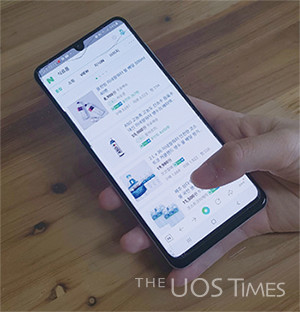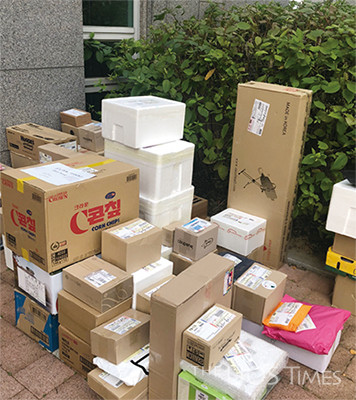
Online Shopping Trend Focusing on the Millennials
Korea is renowned for its quick delivery service. People can order everything “anytime, anywhere” by simply touching their phone screen. In particular, delivery apps for clothes, food, and other supplies are actively used by shoppers in their twenties because using those apps is more comfortable than visiting offline shops. In 2020, online shopping increased to 60.7 percent, notably higher than the percentage of offline shopping-39.3 percent. Moreover, millennials are leading the online shopping trend. According to “Consumer Insight,” a specialized institution conducting customer surveys, the tendency to increase online shopping was above 50 percent among shoppers. In the midst of this change, those in their twenties and thirties represent 67.3 percent of consumers partaking in online shopping.

Moreover, the survey participants were asked about their spending on both online and offline shopping. In terms of gender-based preferences, 66 percent of men in their twenties and thirties chose online shopping, and 68.7 percent of women in the same age bracket also chose online shopping. Furthermore, among single-person households, 66.8 percent chose online shopping as their preferred mode. The results prove that millennials are leading the online shopping trend because they are not only in their twenties and thirties but also live alone for commuting to university or office.
Delivery Service in Our Lives
Due to the COVID-19 pandemic, the quantity of delivery services has increased by approximately 20 percent starting from January to August this year. Furthermore, in June, when a mass infection occurred in Itaewon, the utilization rate increased to 36 percent. This indicates that the average amount of assigned parcels for a single delivery worker is over 5,000, and each worker should deliver at least 255 parcels in a day. Therefore, ahead of the Chuseok period (Korean traditional Thanksgiving Day, in English), delivery workers implemented nationwide strikes due to excessive work and poor working environments. Because people intended to send items instead of visiting their homes due to the pandemic, there were numerous complaints about the strike. Simultaneously, people could focus on the background of the strike and notice “what’s behind our convenience.”

The way our parcels are delivered to us
Suppose that a student at University of Seoul (UOS) ordered some clothes in the dormitory. When the order is accepted, the items are sent to the local agencies by the clothing company. On the following day, the assigned delivery worker must arrive at the local agency by 7 a.m. because parcels from various parts of the country are gathered in local agencies. The parcels are from hub terminals (the place where the parcels are classified based on regions). The classified parcels are sent to the sub-terminal. Here, the work of the delivery worker begins.
Each sub-terminal has 150 to 200 delivery workers. Finding the assigned parcels from the sub-terminal is complicated; therefore, it normally takes approximately 6 to 7 hours. In particular, during the COVID-19 pandemic, the demand for supplies dramatically increased. Therefore, the delivery worker spends a lot of time finding the parcels. There is no compensation for classification work, but delivery workers normally undertake those difficult tasks, as usual. After completing the classification, the real task of the delivery worker starts at 3 o’clock. To deliver hundreds of parcels, including the clothes of the aforementioned UOS student, delivery workers even work during the night. After receiving the clothes, the student would be satisfied at the quick “one-day delivery” service.
About Nationwide Delivery Strike
In this situation, a strike was implemented. Between 2012 and 2019, there were a total of 18 industrial accidents-2.25 accidents per year. However, in 2020, seven industrial accidents were noted in a single year. Moreover, according to the survey conducted by the Industrial Accident Task Force Committee targeted 800 delivery workers, the average working time per week was 71.3 hours. These statistics showed that delivery workers have been suffering from an excessive amount of work. However, although delivery workers are at high risk of industrial accidents, only 7,000 of the 40,000 delivery workers signed for occupational health and safety insurance. The problem was not limited to these poor working conditions but also applies to the revenue of delivery workers. Delivery workers only receive from 600 to 700 KRW per parcel. Therefore, delivery workers should deliver at least 100 parcels to maintain living expenses per day.
Therefore, delivery workers from major delivery companies, including CJ, Hanjin, and Lotte, had signed for an extended delivery strike after September 21 and ceased classification work. This became a significant issue, in particular, because of the Chuseok period. After negotiation, workers called off the strike on September 18. The government decided to increase the workforce for the Chuseok period to reduce the burden of delivery workers. Overall, 10,000 workers were placed in the hub terminal and sub-terminal per day. In addition, the Ministry of Employment and Labor promised to improve working conditions to prevent the excessive working hours of delivery workers and ensure the safety of their health. In terms of delivery companies, company executives would try their best to prohibit overtime work and provide regular healthcare services for the workers. They promised to adjust the districts following the requests of delivery workers. For those conventions, the committee positively accepted those efforts, and thus called off the strike. However, the committee also emphasized that if these promises were not implemented, the strike would restart at any time.

Changes After Delivery Strike
Two months have passed after the nationwide strike, and there have been both positive and negative changes. On October 27, 250 delivery workers from Lotte declared an indefinite strike. They insisted that although the profit of Lotte delivery increased dramatically due to the COVID-19 pandemic, the delivery fee is gradually being decreased. According to statistics, the business profits of Lotte in the first half-year were over 16 million KRW, which was 30 percent higher, compared to 2019. However, the delivery fee was decreased from 968 KRW in 2017 to 825 KRW in 2020.
Moreover, they claimed that Lotte imposed excessive penalties, depending on customer complaints, and forced workers to pay the costs of loading and unloading boxes, which is free for other companies. Therefore, Lotte declared that the company would eliminate penalty fees and control moderate working loads for workers. They also added the provisions about occupational health and safety insurance. As a result, the workers called off the strike on October 31.
However, there are not only negative changes. There are also positive changes, such as “nice enterprise,” which refers to the companies paying close attention to improve the environment of delivery workers. For example, Coupang applied to be registered as a “Courier Service Operator.” Gaining the qualification means that Coupang can only do “distribution working” in the middle of the service. In other words, Coupang will deliver parcels from other companies to the customers and receive transportation charges. Although Coupang originally owned this qualification, the company had returned the qualification due to the COVID-19 pandemic.
Therefore, Coupang registered as a Courier Service Operator again. Moreover, the company claimed that they would hire a delivery working force to ensure workers only had 52 working hours per week (five days) and operated classification working forces with four major insurances. The changes in Coupang are meaningful because until now, unpaid classification work has been the major reason for industrial accidents of delivery workers. Therefore, starting from Coupang, the working environment of delivery workers is expected to improve in the overall delivery working field.
*Four major insurances (National pension, Health insurance, Employment insurance, and Occupational health and safety insurance)*
Another Aspect of Delivery Service: Food Delivery
In addition to Coupang, one of the famous food delivery companies “Bae-min” showed improvements. Due to the COVID-19 pandemic and the efficient food delivery applications, people preferred to order food delivery at their homes instead of going outside because almost every type of food is delivered fast and users can even see the ratings of the restaurant, the trend shifts from eating outside to food delivery. Because Bae-min is familiar to the millennial generation, the changes in Bae-min significantly influenced society. Food delivery service company “Bae-min Riders” and “Elegant Youth” have signed a group agreement for the improvement of treatment and environment of delivery workers.
According to the company Elegant Youth and Korean Confederation of Trade Union (KCTU), the companies voluntarily made a convention as the issue of delivery workers has risen throughout society. In this convention, the “Right of delivery workers to work in a safe environment,” “Strengthening welfare to improve the working environment,” and “Improvement of social awareness of delivery workers” are included. The company and KCTU declared that they would eliminate the brokerage fee of 200 to 300 KRW that had been imposed earlier. Moreover, the delivery workers in Bae-min would receive welfare services. The regular safety education is supposedly implemented, thereby ensuring improvements in the environment of delivery workers by stopping the delivery service in the case of natural disasters, such as hurricanes or heavy rain.
Related to the revised delivery service of Bae-min, a unique industry has been invented. It is named “Bae-min Connect.” Bae-min Connect is a type of delivery service that is open to everyone. People can register on the application and share delivery of the services of Bae-min alongside the real delivery workers, similar to a part-time job. The difference between a normal part-time job and Bae-min Connect is that the user can choose the available time and vehicles, such as bicycle, walking, or scooter. To avail of this service, the user must be above 19 years of age. The payment is in proportion to the distance and is calculated on a weekly basis. The estimated hourly wage is approximately 15,000 KRW. The purpose of the Bae-min Connect is primarily aimed at reducing the burden of delivery workers. Because the time and location are not fixed, those in their twenties join Bae-min Connect, instead of looking for a part-time job. Compared to other delivery part-time jobs, the Bae-min Connect is open for everyone, regardless of gender. Because the scooter is trendy in recent times, college students not only earn money, but also have fun riding the scooter for useful purposes.

In addition to the revised provisions, social awareness about the plight of delivery workers has changed throughout the nation. According to the survey conducted between October 29 to November 5 by the Anti-Corruption and Civil Rights Commission that was targeted at 1628 people, 87.2 percent answered that they would endure the delay of parcels to improve the working conditions of delivery workers. Moreover, 95.9 percent agreed to make signing occupational health and safety insurance mandatory, and 95.6 percent stated that the working hours of delivery workers must be reduced. A total of 73.9 percent answered that they could accept an increase in the delivery fee to improve the working conditions of delivery workers. To summarize, the entire nation is paying close attention to the rights of delivery workers.
August 14 is Courier’s Holiday, when all delivery workers must rest, except for minor companies. It was initially implemented to protect the rights of delivery workers and reduce their burden. There have been numerous changes after the nationwide strike. Although the change may be slow, notable changes have been made. In addition to the institutional improvements, society must remember that behind one’s convenience are also the efforts of delivery workers.
Heo Hyang-ki
ashely1110@uos.ac.kr

